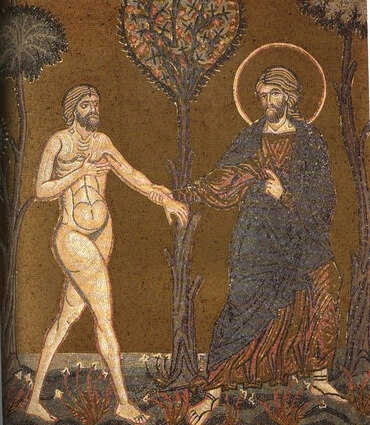1
Når nogen stjeler en okse eller et får og slakter eller selger dem, så skal han gi fem okser istedenfor oksen og fire får for fåret.
2
Dersom tyven blir grepet mens han bryter inn, og blir slått så han dør, da kommer det ingen blodskyld derav.
3
Men skjer det efterat solen er gått op, da blir det blodskyld derav. Tyven skal gi full bot; har han intet, skal han selges til vederlag for det han har stjålet.
4
Dersom det han har stjålet, finnes levende hos ham, enten det er en okse eller et asen eller et får, da skal han gi dobbelt igjen.
5
Når nogen lar sitt fe beite på sin aker eller i sin vingård, og han slipper det løs så det kommer til å beite på en annens aker, da skal han gi i vederlag det beste på sin aker og det beste i sin vingård.
6
Når ild bryter løs og fatter i tornehekker, og kornbånd eller det stående korn eller hele akeren brenner op, da skal den som voldte branden, gi fullt vederlag.
7
Når nogen gir sin næste penger eller gods å gjemme, og det blir stjålet bort fra mannens hus, da skal tyven, om han finnes, gi dobbelt igjen.
8
Men finnes ikke tyven, da skal husets eier føres frem for Gud*, forat det kan avgjøres om han ikke har forgrepet sig på sin næstes eiendom. / {* se 2MO 21, 6.}
9
Hver gang det gjelder svikefull adferd med gods, enten det er en okse eller et asen eller et får eller klær eller i det hele noget som er kommet bort, og så en sier: her er det, da skal saken mellem de to komme frem for Gud*; den som Gud dømmer skyldig, han skal gi sin næste dobbelt igjen. / {* se 2MO 22, 8.}
10
Når nogen gir sin næste et asen eller en okse eller et får eller i det hele noget husdyr å ta vare på, og det dør eller kommer til skade eller røves uten at nogen ser det,
11
da skal ed ved Herren skille mellem dem og avgjøre om han ikke har forgrepet sig på sin næstes eiendom, og eieren skal ta eden for god, og den andre skal ikke gi noget vederlag.
12
Men blir det stjålet fra ham, da skal han gi dets eier vederlag.
13
Blir det revet ihjel, da skal han føre det frem til bevis; han skal ikke gi vederlag for det som er revet ihjel.
14
Når nogen låner et dyr av sin næste, og det kommer til skade eller dør, og dets eier ikke er til stede, da skal han gi full bot.
15
Men dersom eieren er til stede, da skal han ikke gi vederlag; dersom det er leiet, går det inn i leien.
16
Når nogen forfører en jomfru som ikke er trolovet, og ligger hos henne, da skal han gi festegave for henne og ta henne til hustru.
17
Dersom faren ikke vil la ham få henne, da skal han gi så meget i pengebøter som en pleier å gi i festegave for en jomfru.
18
En trollkvinne skal du ikke la leve
19
Enhver som blander sig med fe, skal visselig late livet.
20
Den som ofrer til avgudene og ikke til Herren alene, skal være forbannet.
21
En fremmed skal du ikke plage og ikke undertrykke; for I har selv vært fremmede i Egyptens land.
22
I skal ikke plage nogen enke eller farløs;
23
dersom du plager dem, og de roper til mig, skal jeg visselig høre deres rop,
24
og min vrede skal optendes, og jeg skal slå eder ihjel med sverdet, og eders hustruer skal bli enker og eders barn farløse.
25
Dersom du låner penger til nogen av mitt folk, til den fattige som bor hos dig, da skal du ikke være imot ham som en ågerkar; I skal ikke kreve renter av ham.
26
Dersom du tar din næstes kappe i pant, skal du gi ham den igjen før solen går ned;
27
for den er det eneste dekke han har, det er den han skal klæ sitt legeme med; hvad skal han ellers ligge i? Og når han roper til mig, vil jeg høre; for jeg er barmhjertig.
28
Gud* skal du ikke spotte, og en høvding blandt ditt folk skal du ikke banne. / {* se 2MO 21, 6.}
29
Av alt det som fyller din lade, og som flyter av din vinperse, skal du ikke dryge med å gi mig. Den førstefødte av dine sønner skal du gi mig.
30
Det samme skal du gjøre med ditt storfe og ditt småfe; syv dager skal det være hos moren; den åttende dag skal du gi mig det.
31
I skal være hellige mennesker for mig; I skal ikke ete kjøtt av ihjelrevne dyr som I finner på marken; I skal kaste det for hundene.







